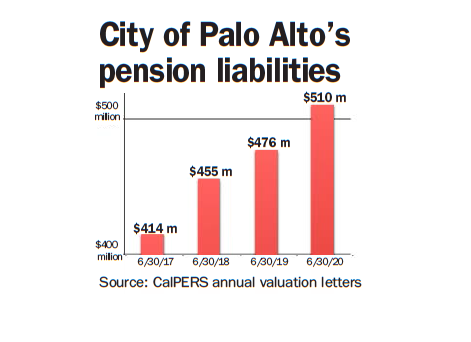
OPINION
BY DAVE PRICE
Daily Post Editor
Palo Alto’s pension liabilities continue to grow, and the city needs to take stronger actions.
The first rule of holes is: Stop digging.
CalPERS, in its annual letter to the city on the value of the city’s pension funds, says the city’s unfunded liability is a staggering $510.4 million as of June 30, 2020.
That’s right — half a billion dollars!
The liability increased by $90.5 million since June 30, 2017.
To its credit, the city set up a side fund in 2017 (called a Section 115 trust) to help the city in case CalPERS can’t pay retirees. But that fund has only accumulated $37.3 million since 2017.
However, the city’s debt has grown by $90 million since 2017 and the fund designed to stave off trouble has only grown by $37.3 million in the same period.
The city’s side fund isn’t keeping pace with its liabilities.
What to do?
The city can’t cut the pension benefits of current or former employees because of prior court rulings. But it can reduce the benefits for new hires. It’s done that a couple of times, but it takes years for such a move to translate into lower costs because, presumably, the people being hired now won’t retire for 20 or 30 years.
Another idea is to stop hiring people. Anytime an employee leaves, replace him or her with a contractor.
That will work in most departments except police and fire.
In those areas, let’s start looking at outsourcing. Can the police be outsourced to the sheriff, similar to what San Carlos, Millbrae, Half Moon Bay, Saratoga, Los Altos Hills and Cupertino have done?
Instead of worrying about paying pension benefits, pay the sheriff an annual fee.
Can Palo Alto outsource its fire department to Santa Clara County Fire?
While these options may be unappealing to Palo Altans who think the city should be in charge of its services, the day will come when most of the city’s budget will go for pension and medical benefits for retired employees, and those precious city services will have to be cut.
Palo Alto should take stronger actions now to solve this problem instead of passing it along to the next generation.
Editor Dave Price’s column appears on Mondays. His email address is [email protected].
